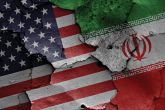
by: Joshua Spurlock, The Mideast Update

danielo/shutterstock.com
Last fall, in a span of just three weeks, ISIS (ISIL) claimed major attacks on three different enemies: Russia, Hezbollah, and the West. From bombing a Russian airliner, to a suicide bombing of a Hezbollah area in Lebanon, to the Paris attacks, ISIS managed to become the global Public Enemy Number One. Opinion pieces and governmental officials have raised the possibility of working together to take on ISIS, also known as Islamic State (IS).
But does that have to mean the Iran–Hezbollah–Syria axis and the West–Israel partnership should coordinate their anti-ISIS efforts? Can an alignment of objectives lead to an alliance? Are enemies of enemies really friends? Israel is warning that is not the case. Just because Iran and their terrorist allies are fighting ISIS doesn’t mean that they share the same goals as the West.
Israel Prime Minister’s Office spokesman Ofir Gendelman, in an email interview with The Mideast Update, noted that radical Islam has long fought with itself. Extremists from the Sunni sect of Islam—which would include Hamas, Al-Qaeda, and ISIS—have fought with Shia extremists—which include Iran and Hezbollah—for centuries. While ISIS seems open to fighting anyone from either side, it fits the model of the internal fight within Islam.
More importantly, the sides are ultimately fighting for the same purpose. Gendelman noted both Sunni and Shia Islam “use terrorism as means to achieve their goal” which is the establishment of an Islamic Caliphate, or empire, under Islamic law. He continued: “Therefore, the world should remember that extremist Islam is not confined only to the Islamic State but also to the Islamic Republic of Iran.”
In other words, the fight between ISIS and the Iran-axis is not the final fight—it’s a stepping-stone to decide which group will lead a global Caliphate. Hence Iran isn’t battling ISIS in concert with the West. As Gendelman noted, Iran “never changed its ideology that views the United States as the Great Satan and Western values as a direct threat to its radical theocracy.” Instead, he believes Iran is fighting ISIS for regional interests and within the context of the Sunni–Shia rivalry.
Said Gendelman, “Regarding Iran a partner in the fight against the Islamic State is not only wishful thinking that is out of touch with reality, but it’s also dangerous to the countries who contemplate this absurd notion.” Just how dangerous is it? It could prove lethal, if Iran’s weapons activities are any indication.

Bruce Stanfield/shutterstock.com
Radical Islam has no problem multi-tasking enemies. While fighting ISIS at the same time as the United States and the West, Iran and Hezbollah were still prepping to wage war against the West—even after Iran signed a watered-down nuclear deal with the major world powers. US Ambassador to the United Nations Samantha Power confirmed that in October, Iran tested a missile “inherently capable of delivering a nuclear weapon.” The comments, released as a statement by the US Mission to the UN, called the move “provocative” and a “clear violation of UN sanctions.”
What’s more, while in theory the missile could be used to strike terrorists, that wasn’t the focus of an Iranian general—global deterrence was. Lt. Commander of the Islamic Revolution Guards Corps (IRGC) Brigadier General Hossein Salami was quoted by the Fars News Agency as saying in November that the missile test “led to a change in the world’s strategic thinking about the Islamic Republic of Iran and disturbed the balance.” Iranian Defense Minister Brigadier General Hossein Dehqan was quoted by Fars as saying the missile is the first long-range missile “capable of hitting and destroying the targets with high-precision.”
The quotes from key Iranian officials show their real belief—which sees the US and Israel as the enemy, not allies. Fars quoted Iran’s Army Commander Major General Ataollah Salehi in November as making the ridiculous claim that ISIS is actually a “US-made hireling” formed with the help of Israel. He also said they would defeat their enemies in the region—including the United States.
Similarly, Hezbollah isn’t limiting itself to the ISIS fight. The Times of Israel reported in November that Israel estimates Hezbollah has upped its missile stockpile to 150,000. Those include long-range missiles capable of reaching the south of Israel. Avi Issacharoff, the author of the article, noted that the implication is that Hezbollah is preparing for a future war with Israel—and not just ISIS.
So, how should the West respond to Iran and Hezbollah’s simultaneous fight with ISIS while preparing to battle America and its allies? By taking the same approach. Israel certainly has been. There have been media reports that Israel has struck weapons in Syria destined for Hezbollah multiple times, while CNN has reported they contributed intelligence regarding the Russian airliner bombed by ISIS in the Sinai. It’s possible to focus on multiple threats at the same time.
While ISIS may be the more immediate concern, the West can take a passive approach to Iran and Hezbollah’s fight with the Islamic State—while at the same time actively preventing the Shia extremist alliance from being ready to target the rest of the world when ISIS is gone. Said Gendelman, “Iran and the Islamic State are both the West’s enemies and if your enemy is fighting another enemy of yours, you shouldn’t be helping any of them. You should weaken both.”
All logos and trademarks in this site are property of their respective owner. All other materials are property of Bridges for Peace. Copyright © 2025.
Website Site Design by J-Town Internet Services Ltd. - Based in Jerusalem and Serving the World.